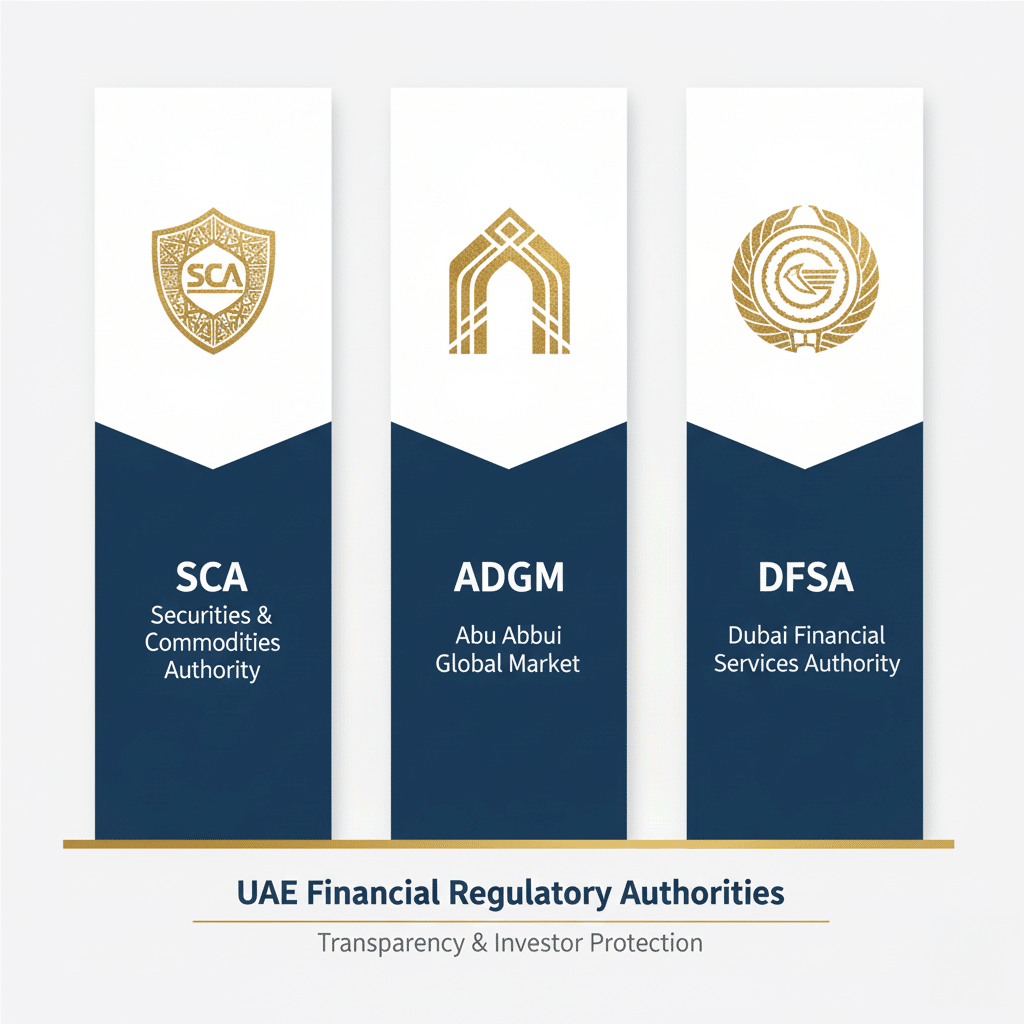Getting started with online trading in Abu Dhabi can feel like navigating a maze. With countless platforms, complex fee structures, and concerns about security, many aspiring investors feel overwhelmed and unsure where to begin. You have the capital and the ambition, but the lack of clear, localized information can be paralyzing. This isn’t just another list of brokers. This is your definitive, action-oriented guide designed to cut through the noise and empower you to invest with confidence. By the end of this article, you’ll have a clear framework for choosing the Best Trading Apps in Abu Dhabi that truly aligns with your financial goals.
We will walk you through a step-by-step journey, starting with the most critical question: is your money safe? We’ll demystify the local regulatory landscape, provide a practical quickstart guide to getting your investor number, and offer a transparent analysis of the true costs of trading.
Is Online Trading Safe in the UAE? Understanding the Regulatory Landscape
Before you invest a single dirham, it’s crucial to address the most important question: is online trading safe in the UAE? The answer is a resounding yes—if you use a properly regulated platform. The UAE has a robust regulatory framework designed to protect investors and ensure market integrity. Understanding these key authorities is your first line of defense.
There are three main regulatory bodies that oversee financial markets and brokers in the UAE:
- Securities and Commodities Authority (SCA): The SCA is the primary federal regulator for the UAE’s onshore financial markets, including the Abu Dhabi Securities Exchange (ADX) and the Dubai Financial Market (DFM). Most local brokerages that offer access to these exchanges are licensed and supervised by the SCA. They set the rules for trading, licensing, and compliance to protect the public.
- Abu Dhabi Global Market (ADGM): The ADGM is an international financial free zone in Abu Dhabi with its own independent regulatory framework and courts. Its Financial Services Regulatory Authority (FSRA) licenses and supervises a wide range of financial institutions, including international brokers that operate within its jurisdiction. The ADGM is known for its high, internationally-aligned standards.
- Dubai Financial Services Authority (DFSA): Similar to the ADGM, the DFSA is the independent regulator for the Dubai International Financial Centre (DIFC), another major financial free zone. Brokers licensed by the DFSA adhere to a comprehensive set of international best practices.
To ensure your safety, you must always verify a broker’s license on the official public register of these authorities before depositing funds. A legitimate broker will be transparent about its regulation and will proudly display its license number. If you cannot find a broker on the official registers of the SCA, ADGM, or DFSA, you should not entrust them with your money.

How to Start Trading Stocks in the UAE: Your 3-Step Quickstart Guide
One of the biggest hurdles for beginners is understanding the specific local requirements. Unlike in many other countries, you can’t simply download an app and start trading on the local exchanges immediately. Here is a practical, step-by-step guide to get you started.
Step 1: Obtain Your National Investor Number (NIN)
A National Investor Number (NIN) is a unique identifier required for any individual who wants to trade securities listed on the Abu Dhabi Securities Exchange (ADX) or the Dubai Financial Market (DFM). Think of it as your passport to the UAE’s stock markets. You typically obtain your NIN through the licensed brokerage you choose to open an account with. They will facilitate the application process with the respective exchange on your behalf.
Step 2: Choose a Regulated Broker and Open Your Account
Using the criteria we’ll discuss in the next section, select a broker that is licensed by the SCA or one of the financial free zone authorities (ADGM/DFSA). The account opening process is now largely digital and straightforward.
Checklist for Opening a Brokerage Account:
- Completed account application form (usually online)
- A valid copy of your Emirates ID (for residents)
- A valid copy of your passport and visa page (for residents)
- Proof of address (e.g., a recent utility bill)
- Bank account details for funding and withdrawals
Step 3: Fund Your Account and Place Your First Trade
Once your account is approved and you have your NIN, you can fund it via bank transfer or other methods offered by the broker. Take some time to familiarize yourself with the platform’s interface—many offer demo accounts to practice without risk. When you’re ready, you can research a company you’re interested in and execute your first buy order. Congratulations, you are now an investor!

Key Factors to Compare Online Trading Platforms in Abu Dhabi
Choosing the right platform is a personal decision that depends on your experience level, investment goals, and budget. Instead of just picking a name from a list, use this framework to evaluate your options and find the perfect fit.
Regulation and Security: Your #1 Priority
We cannot stress this enough: your top priority must be regulation. Before considering fees or features, confirm that the platform is licensed by a reputable authority like the SCA or the ADGM’s FSRA. Beyond licensing, look for key security features like two-factor authentication (2FA) to protect your account from unauthorized access and SSL encryption to secure your data.
Fees and Commissions: Understanding the Total Cost
High brokerage fees can significantly erode your investment returns. To make an informed decision, you need to look beyond the headline commission rate and understand the “total cost of trading.” This includes several types of fees:
- Commission: A fee charged by the broker for executing a trade (buying or selling a stock). This can be a flat fee or a percentage of the trade value.
- Spreads: Primarily for CFD or forex trading, this is the small difference between the buy and sell price of an asset, which acts as a hidden cost.
- Inactivity Fees: Some brokers charge a monthly fee if you do not make any trades for a certain period.
- Withdrawal/Deposit Fees: Fees charged for moving money in or out of your trading account.
Always read a platform’s fee schedule carefully to avoid any unpleasant surprises.
Platform & App Usability: A Focus on User Experience
A cluttered or confusing platform can lead to costly mistakes, especially for beginners. The best stock trading app in Abu Dhabi for you will be one that you find intuitive and easy to navigate. Look for a clean interface, simple order execution, and easy access to your portfolio information. Most importantly, check if the broker offers a free demo account. This is an invaluable tool that allows you to test the platform’s usability with virtual money before you commit your own funds.

A Review of the Top 6 Trading Platforms for Abu Dhabi Investors
Here is a detailed look at some of the best trading platforms available to investors in Abu Dhabi, evaluated based on the criteria of regulation, cost, and user experience.
1. ADCB Securities: Best for ADCB Bank Customers
ADCB Securities is the brokerage arm of the Abu Dhabi Commercial Bank. It offers a user-friendly platform for trading stocks, bonds, and ETFs with a direct link to the Abu Dhabi Securities Exchange (ADX) and Dubai Financial Market (DFM).
- Regulated by: Securities and Commodities Authority (SCA)
- Pros: Seamless integration for existing ADCB bank customers, making funding and withdrawals simple. The platform is generally considered straightforward and suitable for beginners focused on local UAE markets.
- Cons: Market access is primarily focused on the UAE and select regional markets, which may be limiting for those seeking global diversification. The fee structure may not be the most competitive compared to some international brokers.
2. FAB Securities: Advanced Tools for Experienced Traders
Backed by the UAE’s largest bank, First Abu Dhabi Bank, FAB Securities provides a powerful and reliable trading platform. It caters to a wide range of investors, from individuals to institutional clients, offering advanced tools and comprehensive market insights.
- Regulated by: Securities and Commodities Authority (SCA)
- Pros: Strong E-A-T signal due to its association with FAB. Offers advanced trading platforms with sophisticated tools for market analysis, making it a good choice for more experienced traders.
- Cons: The advanced nature of the platform might present a steeper learning curve for absolute beginners. Fee structures may be more suitable for higher-volume traders.
3. Saxo Bank: Best for Access to Global Markets
Saxo Bank is a Danish investment bank with a strong presence in the UAE. It is renowned for its comprehensive platform that provides access to an extensive range of global markets and financial instruments, including stocks, ETFs, forex, commodities, and options.
- Regulated by: Internationally by the Danish FSA and locally licensed in the UAE (ADGM).
- Pros: Unmatched access to international markets, allowing for true global portfolio diversification. Offers powerful, professional-grade trading platforms (SaxoTraderGO and SaxoTraderPRO) with excellent research tools.
- Cons: Its tiered account structure and pricing can be complex. While powerful, the platform may be overwhelming for a beginner whose sole focus is buying a few local stocks.
4. Emirates NBD Securities: A Seamless Experience for Stock Trading
As the brokerage arm of another one of the UAE’s leading banks, Emirates NBD Securities offers a trusted and seamless trading experience. Its platform is particularly well-regarded for its ease of use in stock and ETF trading, supported by real-time market data.
- Regulated by: Securities and Commodities Authority (SCA)
- Pros: Strong brand reputation and trust within the UAE. The platform is known for being user-friendly, making it a solid choice for beginners. Easy account integration for Emirates NBD bank customers.
- Cons: Similar to other bank-led brokerages, its primary focus is on local and regional markets. Investors seeking extensive global asset classes may need to look elsewhere.
5. Al Ramz Corporation: A Sophisticated Local Brokerage
Al Ramz Corporation is a well-established investment firm in the UAE with a long-standing presence in the market. It provides a sophisticated trading platform with robust features for trading local stocks and bonds, complemented by detailed market analysis and research.
- Regulated by: Securities and Commodities Authority (SCA)
- Pros: Deep experience and a strong reputation within the UAE financial landscape. Offers value-added services like market research and analysis, which can be beneficial for active traders.
- Cons: May be more tailored towards high-net-worth individuals or active traders rather than casual, small-scale beginners. The user interface may feel more traditional compared to newer fintech platforms.
6. Abu Dhabi Securities Exchange (ADX): Direct Market Access
The Abu Dhabi Securities Exchange (ADX) is the market itself, but it also offers a direct trading platform called SAHMI. This allows investors to trade directly on the exchange, often facilitated through a registered broker.
- Regulated by: As the exchange, it is the ultimate authority for Abu Dhabi-listed securities, overseen by the SCA.
- Pros: Trading directly via the exchange platform can sometimes offer lower commission costs. It is the most direct and authoritative way to interact with the Abu Dhabi market.
- Cons: The platform is purely for execution and lacks the comprehensive research tools, educational resources, and customer support that a full-service broker provides. It’s a no-frills option best suited for investors who know exactly what they want to trade.

Abu Dhabi Trading Platform Comparison Table
To help you see the options at a glance, here is a summary table comparing the key features of the platforms reviewed.
| Platform | Primary Regulator | Best For | Commission Structure | Mobile App Rating |
|---|---|---|---|---|
| ADCB Securities | SCA | ADCB Bank Customers & Beginners | Percentage-based, standard for local markets | User-friendly |
| FAB Securities | SCA | Experienced Local Traders | Competitive for active traders | Advanced features |
| Saxo Bank | ADGM / Danish FSA | Global Market Access | Tiered, based on volume/account level | Professional-grade |
| Emirates NBD Sec. | SCA | Beginners & ENBD Customers | Percentage-based, standard for local markets | Simple & intuitive |
| Al Ramz Corp. | SCA | Active Traders & HNWIs | Geared towards active trading | Sophisticated |
| ADX (SAHMI) | SCA | Direct Market Execution | Potentially lower cost, execution only | Functional |
Your Trading Journey Starts Now
Choosing a trading platform in Abu Dhabi no longer needs to be a source of confusion or anxiety. By following a clear and logical framework, you can confidently step into the world of investing. The key takeaways are simple but powerful: always prioritize safety by selecting a broker regulated by the SCA or ADGM, take the time to understand the full fee structure to protect your profits, and choose a platform with a user experience that matches your skill level and investment ambitions.
You are now equipped with the knowledge to make an informed decision. Your journey starts now. Revisit our 3-step quickstart guide, choose a platform from our comparison that fits your needs, and begin the process of applying for your National Investor Number (NIN) today.
Financial Disclaimer: The content in this article is for informational purposes only and should not be considered financial or investment advice. All investments carry risk, and you should consult with a qualified financial professional before making any investment decisions.



